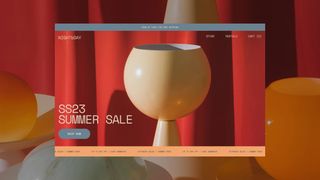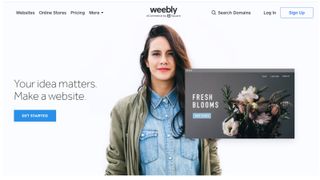In an economy that lends itself to being fleet of foot, it's unsurprising to find increasing numbers of people turning to freelancing in the web industry. However, what might seem idyllic on the surface is more complex than it first appears. The relative freedom in where, when and how to work is balanced with legal and business issues; the need to find work and ensuring you don't bathe yourself in the light of a glowing screen every hour of the day, every day of the year.
In this feature, we'll be exploring every aspect of being a freelancer (aside from actually making the sites). You'll find important tips on everything from invoicing to remembering there's life beyond work.
Have the right attitude
01. Be amazing at something
"You need to be a specialist," asserts Andy Budd, founder of Clearleft. "Be known as the best Ruby developer in Brighton or the best UX person in London. Don't just settle for being one of several thousand fair-to-middling freelancers who never get picked to do great work and will just only be recommended by a smaller group of connections."
To succeed, Sally Jenkinson, a freelance digital consultant, says it's imperative to "know what you enjoy and where your strengths lie". After all, you got into freelance to do what you love, right?
02. Take some risks
Jenkinson also reckons it's easy to get stuck in a rut. In contrast, by deliberately doing things that scare you, she believes huge pay-offs are more likely. She believes, "If you've always wanted to speak at a conference but nobody has ever approached you, contact some organisers." She adds that, "If you don't think you're experienced enough to win a job, try anyway. Putting yourself out there can be difficult, but if you don't ask, you don't get! Stop being afraid and just do it."
Get your name out there
03. Have your own website
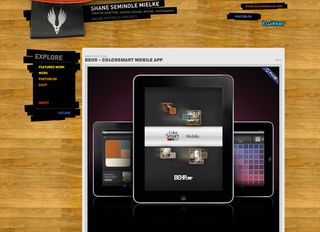
Freelance designer/developer Shane Mielke recognises the importance of promoting yourself on community sites like Behance and Dribbble, but says you must build a wider web presence, because "your work [is] being hosted among competitors." He believes the biggest promotional tool a freelance designer can have is still "a unique personal URL that showcases your talent, skill, personality and creative vision. It's your 'business card' for prospective clients".
04. Write a blog
Authentic Jobs founder Cameron Moll says few activities are more helpful to self-promotion than having a unique, qualified voice. "That's how I got my start," he says. "It led to landing clients and then Authentic Jobs, which I run full-time today. Develop the ability to write consistently with passion about subjects you care deeply about and you'll be amazed at the opportunities that arise for growing and sustaining your business.".
Get the Creative Bloq Newsletter
Daily design news, reviews, how-tos and more, as picked by the editors.
"I've been contacted by companies who've wanted to meet with me after reading an article," adds Hatch partner Mark Kirby, who's also found writing beneficial. "You get to share knowledge, are seen as an expert and become someone companies want to employ."
05. Improve your portfolio
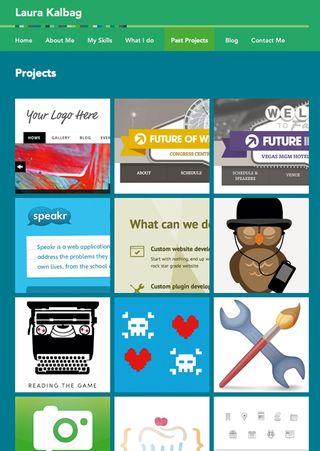
Don't put any old content on your portfolio. Product designer Sacha Greif says it must answer whether you're good but also if you're reliable: "Focus on explaining what you do and prove you're trustworthy. Include case studies and don't just show off pretty pixels."
06. Be more social
A personal site is only part of your online marketing. Kirby suggests investigating regular local meet-ups as a better alternative to swapping business cards at random events. "You'll make friends in the industry and work will be passed to you from these contacts. Although, it's rare anyone recommends someone they met once for 15 minutes."
Todd Motto, designer and developer, agrees. "The biggest mistake I made when I started freelancing at 17 was thinking putting a site online would be all I needed," he recalls. "What I really needed to do was establish relationships, learn from people, ask them to pass my details on and utilise existing contacts." Today, Motto spends plenty of time talking to people, and recommends marketing yourself "as if you've never had a website and never will".
07. Develop your brand
Motto says you must also build your personal brand in everything you do. "It's more than just your tweets, Dribbble account and website," he continues, "it's everything, from your logo and photo to your writing, content and attitude. It's how you wish to be seen as a person." He recommends being personable and likeable, taking care to not push the boundaries too far - "Swearing isn't going to do you any favours" - and imagine everything you do face-to-face and online as "one big CV".
Dealing with clients
08. Choose clients carefully
Motto recommends being tough when it comes to client leads. "Are you even in their price range? Do you need them? Can they afford you? Never let leads take advantage of you. Be firm and professional and don't give away too much," says Motto. Barterers rarely make good clients, he says, so be confident with your approach and pricing, and write straightforward emails without friendly chit-chat.
Web designer Janna Hagan agrees, saying it pays to be choosy with clients, saying, "When you work with great clients and produce high-quality work, you'll likely do more in the future."
09. Widen your range of clients
In these uncertain economic times, designer Mike Kus makes a very good point about relying on a small number of clients to make a living. "A secure design and development business is one with a wide client base. It can be easy to take repeat business, which is great. But don't rely on one or two clients for survival. Instead, keep a wide range of clients so, when one unexpectedly falls away, you're not left in the lurch," he says.
Kus adds that you should also highlight work you'd like to do more of to attract new clients. "Add some side projects if you're in a phase where the work you're doing isn't your cup of tea," he counsels. "Clients hire on the strength and style of past work. Ensure your portfolio is filled with the sort of work you like to do."
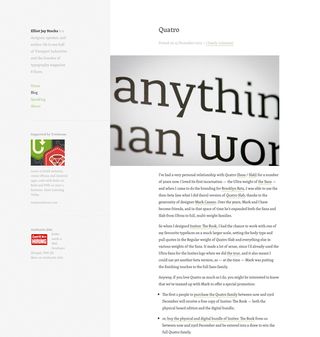
10. Nurture client relationships
Trust is key when dealing with clients. Kus acknowledges people often complain about clients, but reminds "they're the lifeblood of your business so you must deliver the goods". If you need to, he says to occasionally go above and beyond, even if that means the odd late night.
If your clients trust you, they'll recommend you. Designer Laura Kalbag recommends being "honest, friendly and transparent" and to "acknowledge problems and work hard to solve them".
However, when working such hours, Kalbag advises against contacting clients. "Keep communication within office hours. Don't set up an expectation you'll work nights and weekends just because you're self-employed."
Make a better workspace
11. Fit in on site
Frontend developer Anna Debenham has undertaken plenty of on-site work and notes that it "takes adjusting to". Although there's perhaps a temptation to make your mark, she advises you must also shackle your ego and learn to integrate into the company. "There's more collaboration, politics and meetings. You have to make sure you're useful all of the time and you must be respectful of other people who work there. Fit in a bit. Don't just show up in torn jeans and a hoodie. And don't slag off their office even if you really want to!"
12. Define a dedicated workspace
Create a workspace where you can focus and enjoy spending time to help build a routine. If you find it hard to create a division between work and personal life, get an office, says frontend developer Cole Henley: "My extra outgoings on rent more than paid for themselves through helping me focus at work and switch off when at home."

13. Don't be alone
Freelancing can be lonely, and without people to bounce ideas off (outside of social media sites). Mark Kirby recommends considering a co-working space. "You rent a desk or drop-in alongside other freelancers," he says. "After a week at The Werks in Brighton, I found work with two small companies sharing the space. This got my freelance career off the ground and my current business partners were co-workers from the same space."
Time management
14. Nail your work/life balance
Web designer Paul Boag states a major factor in running your own business is getting the work/life balance right. "We aim to escape that overdemanding boss, set our own hours and enjoy a flexible lifestyle, yet many freelancers work longer hours, are tied to their desks and live under constant stress and delude themselves it's 'not work if they enjoy it'." He says you must make time to relax, as he does. "It's about keeping sane. Take a dance or exercise class, or get out and see people. Make sure work doesn't overtake life."
15. Be realistic about your working hours
If juggling projects is a problem, designer Elliot Jay Stocks suggests setting time limits for all tasks – whether that's designing a comp or completing your inbox. "This is called the Pomodoro Technique," he explains, "and I designed my own app for it, which you can find at www.countdone.com."
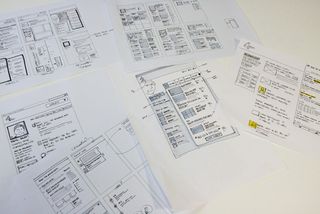
Business and legal issues
16. Keep on top of invoicing
"It's easy to forget the business side of things when working for yourself," cautions developer Keir Whitaker. "Subscribe to one of the many online invoicing and accounting apps, which will provide a great way to keep track of what money is due and owed as well as allowing you to track your time. Also, remember to keep all your business-related receipts. It's tedious, but filing them monthly, along with issued and received invoices, will keep your end-of-year stress to a minimum," he says.
17. Employ legal specialists
Don't try to deal with legal issues yourself. "Get a good accountant. It'll save you money and give you piece of mind you're on the right side of the tax man," says Whitaker. Developer Matt Schiffman agrees. "If you're going to be an independent contractor for the long term, you're also going to need a lawyer," he adds. "You'd be surprised how affordable these types of services are, but, most importantly, having a good lawyer and accountant allows you to focus on running your business and getting your work done."
18. Draw up a contract
Whether you're about to work with an agency or taking on a new client yourself, have a contract, argues Happy Cog founder Jeffrey Zeldman. "It needn't, and shouldn't, be complex, but should clearly state the work you're doing and how and when you get paid." He adds there should be contingencies for if either side wishes to terminate the contract and an estimate of work hours should be included. "Freelancers fear a contract will make them look hostile or aggressive, but that isn't true," he continues. "A simple, basic contract protects both parties and shows you are professional, and that you value both parties' time and expectations."
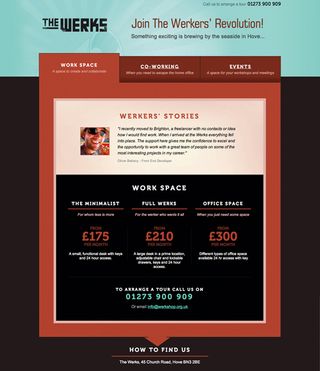
19. Use plain English with clients
Legal speak is sometimes necessary, but where possible it's a sensible idea to use more commonplace language. For example, freelance designer Ayesha Garrett says her quotes are very straightforward, using headings such as 'what you need to provide', 'what you have asked for' and 'what I will deliver'. She explains this makes things clearer in the client's mind about the scope of the project and also what's required of them.
The freelance conundrum
20. Don't rush in
Whether you're considering freelancing or immersed in it, veterans recommend in-house agency work. Web designer Andy Clarke says he'd "always prefer agency experience before freelancing", notably to learn how to work with people. Illustrator and designer Kyle Steed agrees. "Take your time and prepare; cut your teeth at agencies. Learn as much as you can from your peers, ask questions and take notes."
Words: Craig Grannell Main illustration: Mike Brennan
This article first appeared in issue 239 of .net magazine - the world's best-selling magazine for web designers and developers.



